The urban legends surrounding the idea of alligators living in the sewer date back to the late 1920s and early 1930s, which makes it rather surprising that it took until 1980 for such an ideal subject matter to make its way into a horror movie. We got giant ants in the sewers back in 1954 for Christ’s sake why not alligators? It took screenwriter John Sayles to finally pen such an urban epic, but his gator wouldn’t simply be large it would be super-sized!
After the success of Jaws, the rip-offs of Spielberg's summer blockbuster almost become a genre unto themselves, sadly, most of them were terrible and without any artistic merit but with Lewis Teague’s Alligator we got a truly excellent “man against nature” monster movie, one that turned out better than it had any right to be. While there are plot and character elements similar to what appears in the Spielberg shark film, with the main protagonist being a police officer who is helped by an animal expert, and there is a professional hunter who dies similar to that of Quint in Jaws, but he’s more villainous antagonist rather than part of the camaraderie trio in that film, but what John Sayles brought to the story was an environmental slant with the creatures immense size being due to the dumping of the bodies of dead animals that had been subjected to an experimental growth formula and then being eaten by the sewer-dwelling alligator, thus the cause of its increased size.
He's not quite Godzilla but he is the result of man’s disregard for the natural world.
The basic plot of Alligator follows the actions of a PTSD-suffering homicide detective named David Madison (Robert Forster), who lost his previous partner under less-than-ideal circumstances, and it’s his investigations of body parts showing up in the local sewer that brings him into contact with a pet shop owner (Sidney Lassick) who has been stealing dogs and selling them to a Slade Pharmaceuticals for growth experiments. And just how evil is this company? Well, not only does scientist Arthur Helms (James Ingersol) cut the larynxes of his subjects to keep them quiet he demands that the pet shop owner only bring him puppies. It’s safe to say this guy will not be around when the end credits roll, in fact, the film’s big smorgasbord of action takes place at Arthur’s wedding, where he is to be married to his boss’s daughter. It is at the wedding where he and his boss (Dean Jagger), as well as the crooked Mayor (Jack Carter), all meet their untimely ends, which begs the question “Did the alligator get a copy of the script, so it knew where the villains were and who it had to eat?”
The ultimate wedding crasher.
Filling in the role of consulting oceanographer Matt Hooper from Jaws we have herpetologist Marisa Kendall (Robin Riker), who doesn’t believe that Madison’s latest deceased partner (Perry Lang) could have been eaten by a sewer-dwelling alligator, stating that a creature that size would have starved in a week and that the toxic gasses found in a sewer are not conducive to a healthy life. Even his boss Chief Clark (Michael Gazzo) doesn’t believe him and wants David to take a much-needed vacation, but lucky for Madison, a yellow journalist (Bart Braverman), who is one of the reporters that have suggested that Madison may have been responsible for the death of his first partner, is killed by the alligator and was kind enough to leave photographic evidence of the creature’s existence. This results in a failed sewer dragnet that causes the Mayor to sideline Madison and bring in big game hunter, Colonel Brock (Henry Silva), to track and kill the beast, this would be the film’s Quint analog, unfortunately, Henry Silva is never given a cool monologue about being aboard the U.S.S. Indianapolis and is just eaten in a dark alleyway.
"Farewell and adieu to you fair Spanish ladies."
Stray Observations:
• The alligator's first victim is a sewer worker named Edward Norton which is an obvious nod to the character played by Art Carney on The Honeymooners.
• That the alligator in question was flushed into the sewers by Marisa’s father, twelve years ago when she was a child and I’m surprised that her dad didn’t get an ironic death in this film.
• The idea of a victim’s camera taking snapshots of the monster during the attack was also used in Jaws 2 (1978).
• Madison gets fired because of his investigation of Slade Pharmaceuticals, whose owner is friends with the mayor, but no actual grounds are given for his dismissal and any Policeman’s Union would be down on this situation like a ton of bricks.
• Henry Silva’s big game hunter hiring three black youths to be his “native bearers” is as brilliant as it is racist and makes his death even more appealing.
• The two men working the gate at the wedding don’t seem to notice that people are being eaten by a giant alligator a few feet away, then again, this is Chicago so maybe that's normal.
“They send one of yours to the hospital you send one to be alligator food, that’s the Chicago way.”
This may have started off as a simple Jaws rip-off but with Lewis Teague’s deft hand at the helm, and the wonderfully tongue-in-cheek script by John Sayles, they were able to produce a film of admirable quality and a lot of this has to do with such a great cast of character actors, a group that is more than aptly lead by the great Robert Forster, who really nails the whole world-weary cop who is “Too old for this shit” to perfection. It should also be noted that Teague did run into the same problem that Spielberg had concerning his mechanical shark, as the mechanical Alligator did not function all that well or often, but the use of a baby alligator on a miniature set worked surprisingly well.
Certainly, better than the countless dinosaur films that tried the same thing.
Lewis Teague’s Alligator is easily one of the better examples of the genre, one that has brought the world such "classics" as Grizzly and Orca, but John Sayles elevated things by weaving in some nice social commentary – the creature did seem to eat its way up the social-economic food chain – and the movie even had the balls to have the alligator brutally eat a small child. If this “Man against Nature” film has somehow escaped your notice do yourself a favour and track this one down, you won’t be disappointed.

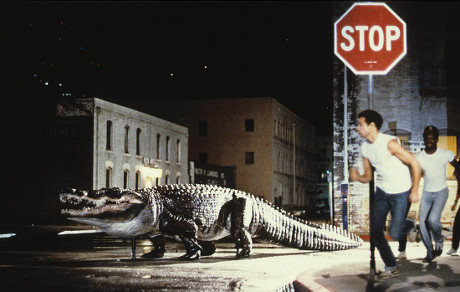
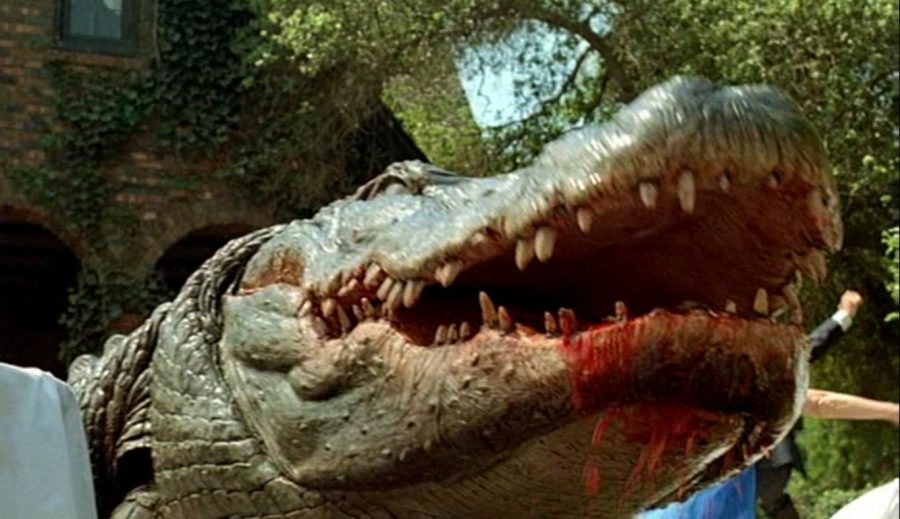
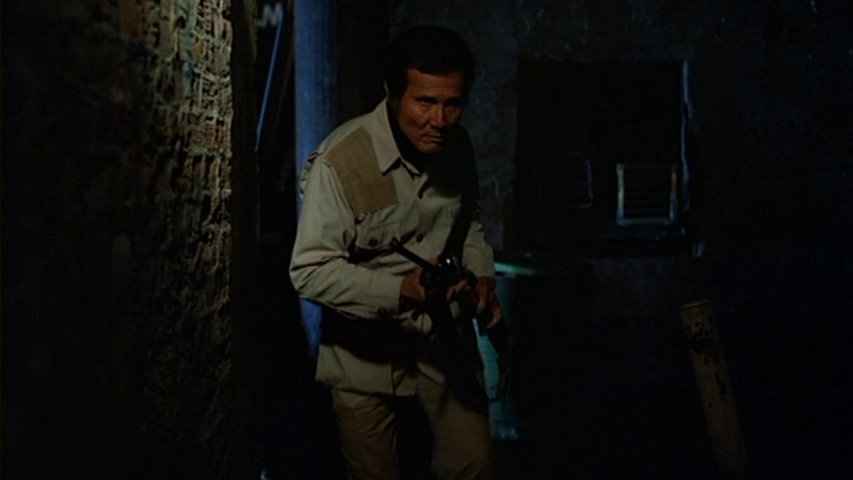
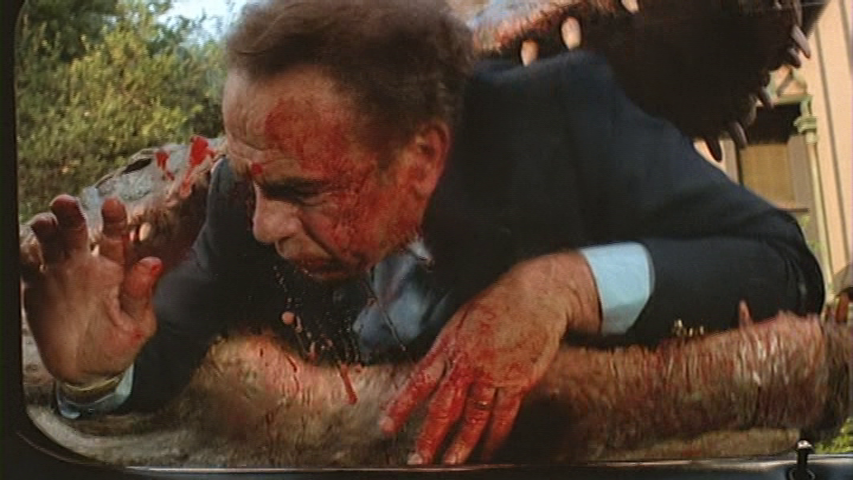
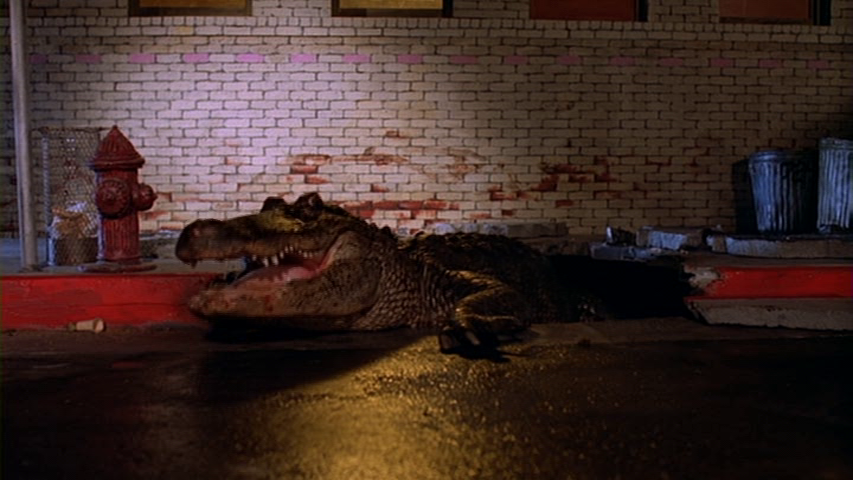

No comments:
Post a Comment